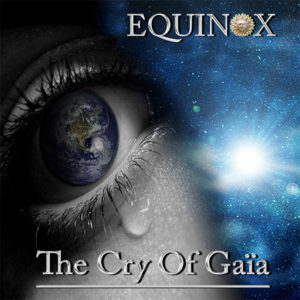Equinox – Cry of Gaia :
f you added guitars and drums to much of Wagner, you might end up with Rammstein: the same huge atonal riffs, epic soaring vocal moments, Teutonic mythology and scary pyrotechnics. Indeed great thunderous riffs permeate classical music – from Beethoven’s « da da da dum » – his Smoke on the Water moment – to Stravinsky’s glorious chuggy percussive bottom end at the start of The Rite of Spring, Prokofiev’s Dance of the Knights, hell, even bits of The Four Seasons, Mozart’s Marriage of Figaro and Ravel’s Bolero to boot have quasi-metal work-out moments. And Rick Wakeman and Deep Purple in the 60s and 70s were among several grandees of prog who tried to forge the two forms more closely together. When it works – perhaps some of Metallica‘s S&M show, where the San Francisco Symphony Orchestra are jumping up and down as the apocalyptic conclusion to One seizes their guts from the inside – it makes the glorious epic nature of prog or metal seem even grander: cathedrals of sound expand to become Piranesi-esque fantasies of potential immense spaces for the Promethean reach of the music. When it doesn’t work – Apocalyptica, Dream Theater‘s bewildered touring chamber orchestra on their Octavarium tour – it is a disastrous mish-mash of the cheesiest ends of both forms.
Like a classical orchestra taming prog-metal, the ancient Greeks believed that Gaia – Mother Earth – emerged to bring order after the reign of Chaos. She then brought forth the sky (Uranus), the sea and the mountains. 5000 years later Gaia is in big trouble because of fracking, too many cars burning fossil fuels and ecological waste on a huge scale. In the last 250 years, since the Industrial Revolution, we have battered Gaia. French band Equinox, imagine her reaction: son « cri ».
Equinox‘s lead man, the beguilingly mononymous Inophis’ mission is clear: to combine a pretty strict late Dream Theater template of songs and arrangements with a more classically symphonic synth/string/brass backing, and add a choir for good measure. Is he creating more chaos to bring home the pain of Gaia? Or is his idea that throwing all this together will somehow balance the chaos, and a new anguished beauty will soar through?
The opening track Moon and Sun is wonderful – a straight choral piece, like an off-cut from Mozart’s Requiem: complex melodies, harmonies and chord progressions, yet all cohering into a stricken palatable whole. Choir and orchestral strings reappear throughout the album (best at the start of A Light in the Chaos) adding interesting texture to the Dream Theater-sounding songs. These break down into 4 types: catchy and proggy, almost poppy numbers like the title track and Time of the Chosen; more full on complex speedy workouts (like The Gates of the Universe), a couple of nice but unadventurous power ballads (I Had a Dream and Amber), and finally a puzzling cover of Queen‘s The Show Must Go On, which seems to belong on another collection.
There is so much to admire on this record, but also some problems. Inophis’s playing is astonishing, and as a showcase for his talents this album does the job very nicely. Drummer Aurelien Ouzoulias is similarly virtuosic, though his drums have been produced with a late 80s kind of sound – way over-compressed and synthetic-sounding (a bit Operation Mindcrime). A drummer this good deserves a more lush sound, where we can hear his brilliant playing to the full. Bassist Pascal Mulot is also an exceptional player, but he has been positioned low in the mix, which is a shame. Vocalist Emmanuel Creis complete the band. At his best – the higher shoutier moments – he comes through as a (much) more in tune James LaBrie. Sometimes though, it all feels a bit monotonous as he struggles manfully to compete with the band and « orchestra ». Also he has not yet mastered LaBrie’s quieter, more tender vocals, where he can make a mediocre ballard quite powerful (Beneath the Surface, Through Her Eyes).
Inophis clearly seems to want to make « perfect » music. And yet if you tightly quantize every piano, synth and kick drum, and then compress the whole sound to the max, you are in danger of draining the life out of it. Jordan Rudess and John Petrucci are virtuosos, it’s true, with never a note out of place, and yet there is real feeling behind even their most complex of show-off pieces (say, Dance of Eternity). Equinox left this listener slightly cold, and yet full of wonder for their astounding musicianship and arrangements.
I don’t drive. But I do recycle and try not to harm Gaia too much. The social Darwinian in me suspects that we’ve set ourselves on a course where the total depletion of Gaia’s resources is inevitable, and relatively soon. Perhaps this is the ultimate act of recycling, and we’ll end up as a Gaia-colony on another planet. Perhaps there’s a concept album in this? Equinox are brilliant players, and I look forward to their next album building on the considerable positives (not least the gorgeous artwork) of Cry of Gaia.
Link : DPRP






